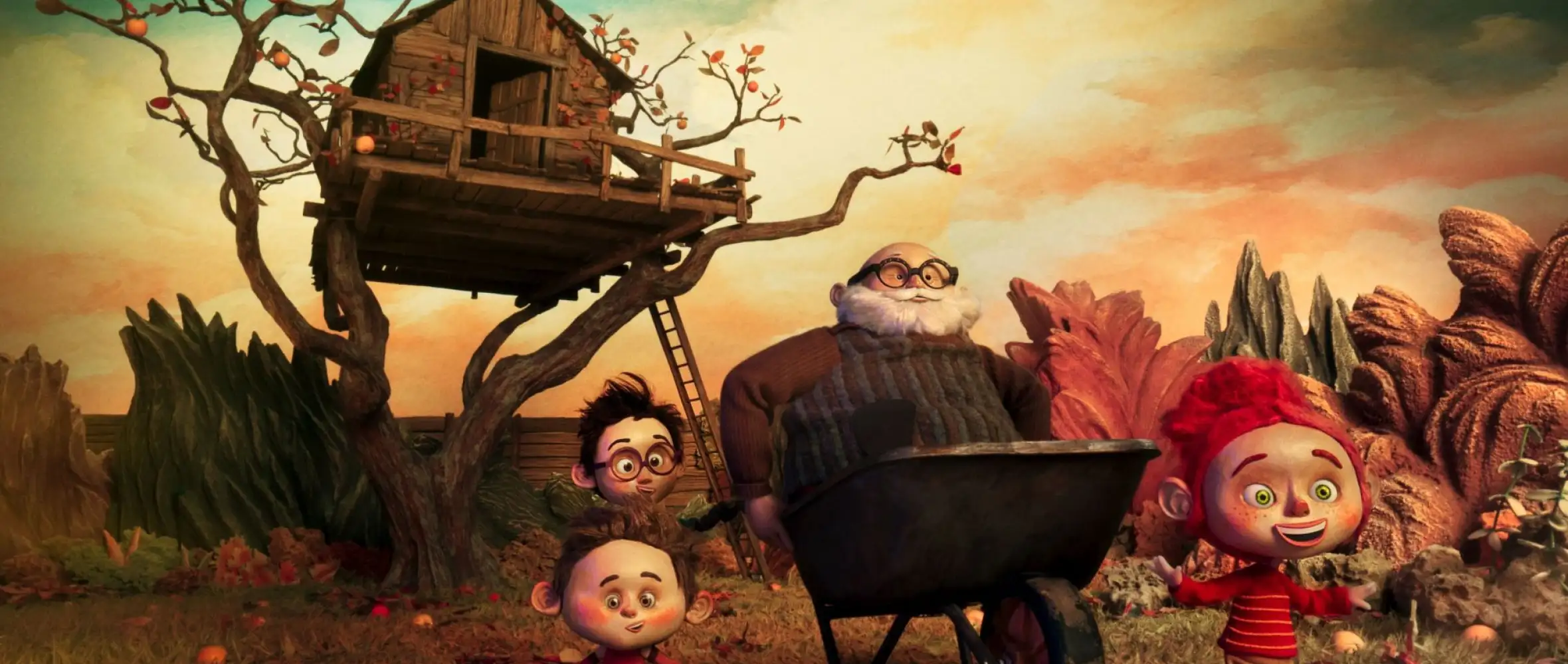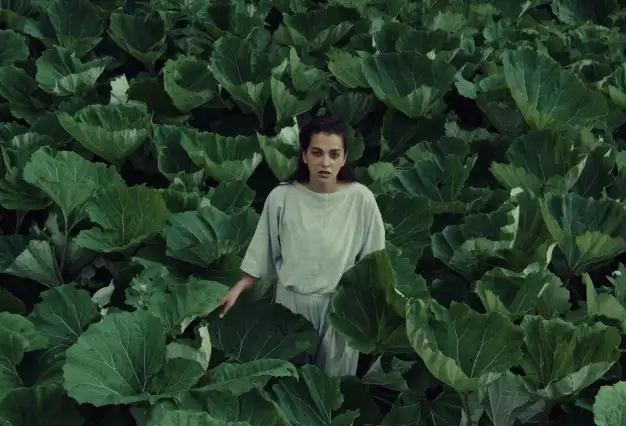
16 January 2025
Berlinale 2025: Of war, loss, and absurdity
Berlinale 2025: Of war, loss, and absurdity

Czech cinema has a long-standing presence at the Berlin International Film Festival, and the 75th edition of the Berlinale will continue in this tradition, featuring works by Czech directors and producers spanning genre and form, including two animations, and a documentary.
by Martin Kudláč for CZECH FILM / Spring 2025
For years now, Czech cinema has enjoyed a consistent presence at the illustrious Berlinale, with works appearing across the festival’s competitive and curated sections. Films like Touch Me Not and Bad Luck Banging or Loony Porn, both coproductions with Czech companies, have netted the Golden Bear in recent years, highlighting the ability of the Czech industry to forge creative partnerships on thought-provoking and boundary-pushing projects. The festival has also served as a launching pad for emerging Czech talent, including Lucie Sunková’s Suzie in the Garden, Adam Koloman Rybanský’s Somewhere Over the Chemtrails, and Philippe Kastner’s Dede Is Dead, as well as Viera Čákanyová’s Notes from Eremocene and the internationally celebrated bio-pic docuessay I’m Not Everything I Want to Be by Klára Tasovská.
The cohort of Czech works at Berlinale 2025 consists of the whimsical stop-motion film Tales from the Magic Garden; the allegorical animusical Stone of Destiny; Vitaly Mansky’s war documentary from his hometown Lvov, Time to the Target, and the true crime miniseries Our People by Tereza Nvotová, selected for the Berlinale Co-Pro Series.
Imaginative puppetry
As Czech animation continues to garner international attention, this year’s competition program Generation Kplus, which “seeks to challenge without overwhelming, nurturing an open and controversial dialogue with its audience,” features the stop-motion feature Tales from the Magic Garden. Based on stories by writer and playwright Arnošt Goldflam, the project embraces his signature poetics of awkwardness, magical realism, and satirical exaggeration.
Tales from the Magic Garden follows three siblings, Derek, Suzanne, and Tom, as they spend their first weekend alone with their grandfather, who has been withdrawn since his wife passed away. At this pivotal moment, Suzanne steps into the role of storyteller, just like their grandmother used to, filling the house with magical tales of humor, adventure, and fantasy. Through their imaginative tales—with each person adding their own ingredient to the mix—they rediscover the healing power of storytelling. As joy and laughter return to the home, the children and their grandfather forge a deeper connection, finding solace and strength in their shared memories.
The film springs from a cross-border collaboration between four producers and production companies: Martin Vandas (MAUR film) for the Czech Republic, Juraj Krásnohorský (Artichoke) for Slovakia, Kolja Saksida (ZVVIKS) for Slovenia, and Jean-Francois Le Corre (Vivement Lundi !) for France. This was mirrored in the creative process, involving directors and creative teams from all four countries, each bringing its own cultural and artistic perspectives. Animator and director David Súkup represented the Czech Republic; Patrik Pašš, Slovakia; Leon Vidmar, Slovenia; and Jean-Claude Rozec directed for the French.
Rooted in the Czech Republic’s rich puppetry tradition, the film incorporates handcrafted puppet designs enhanced with modern innovations under the artistic direction of Patricia Ortiz Martinez. Magnetic facial mechanisms allow for subtle expressions, while aged materials lend authenticity to the sets and costumes. The film’s animation, shot at a unique visual tempo of 12 to 18 frames per second, creates a textured and whimsical aesthetic. This approach reflects the traditions of Czech animation, revitalized by a younger generation of creators.
Funding for the project was provided by the Czech Film Fund, the Slovak Audiovisual Fund, the Slovenian Film Centre, Région Bretagne/Bretagne Cinéma, Viba Film Studio, Creative Europe–MEDIA, and Eurimages. The coproducers were broadcasters Czech Television, STVR in Slovakia, RTV Slovenia, and Pictanovo and Personne n’est parfait! in France. International sales are handled by New Europe Film Sales. Theatrical release has already been secured across all coproducing territories, confirming the enduring appeal and innovation of Czech animation.
Bridging comic, musical, and animation
Czech animation also takes center stage as part of the Berlinale Shorts section, dedicated to “stretching boundaries and laying down new tracks in the vast field of cinematic possibilities,” where Julie Černá’s animated short musical, Stone of Destiny, will make its world premiere. This project by the animator and illustrator Černá, a student at the Academy of Arts, Architecture, and Design in Prague (UMPRUM), explores themes of self-discovery, loneliness, and personal growth through a lyrical narrative.
Based on Černá’s award-winning comic-book trilogy of the same name, the 11-minute film, rendered in 2D hand-drawn animation, follows the titular Stone of Destiny on a symbolic journey punctuated by allegorical encounters. The character of the stone, serving as an alter ego for the director, reflects Černá’s personal exploration of identity. “The Stone of Destiny is sometimes the hero, sometimes the antihero of his story,” Černá said. “Sometimes he hurts or manipulates his friends with his words and actions, but he can also be very sensitive and balanced. I want to show with his story that it’s OK to have conflicts while trying to find yourself.”
Originally conceived as a therapeutic storytelling exercise, Stone of Destiny the comic book earned the Muriel Prize for Best Student Comic Book in 2022. The animated adaptation preserves the emotional depth of the source material while incorporating a musical score by Johana Novotná, which enhances the narrative with an auditory layer of expression. Černá’s minimalist graphic style translates seamlessly into animation, enriching the film’s metaphorical content and giving it a distinct visual identity. “I chose to tell this story in the form of an animated musical because the atmosphere of this genre fits perfectly with the universe of Stone of Destiny and its specific poetics. The musical contributions guide the viewer through the plot and comment on some of the protagonist’s experiences that would otherwise remain hidden. In addition,” says the director, “the rhymed songs lend the film a pleasant playfulness and a certain wit.”
The film was produced by Kristína Husová of Pure Shore, whose output of animated shorts includes Andrea Szelesová’s Sisters, which won 11 awards and screened at over 60 festivals. Coproduced with UMPRUM, Stone of Destiny exemplifies the collaborative spirit of the Czech animation scene. The project won support from Filmtalent Zlín and Studio FAMU. Combining personal storytelling, visual lyricism, and musical elements, Černá’s work fits squarely within the broader tradition of Czech animation, while offering a contemporary perspective that resonates with younger viewers.
Chronicles of war
This year’s Berlinale will also host the world premiere of Time to the Target, the latest work from prolific documentarian Vitaly Mansky. Following his 2023 film, Eastern Front, which screened in the festival’s Encounters competition, Mansky returns with a new project coproduced by the Czech company Hypermarket Film, with which the filmmaker has a lasting creative partnership. Time to the Target will debut in the Forum section, known for its focus on socioartistic discourse and its mission to “expand the understanding of what film is, test the boundaries of convention, and open up fresh perspectives on cinema and its relation to the world.”
In Time to the Target, Mansky revisits his hometown of Lvov to document the rhythms of life in a city shaped by the war in Ukraine. While geographically removed from the frontlines, Lvov bears witness to the war’s impact, with the everyday routines of weddings, school, and childbirth unfolding against the constant threat of Russian missile attacks. Central to the documentary is a military brass band whose performances, once reserved for celebrations, have become a poignant presence at funerals.
The narrative highlights the personal stories of the band members. Viktor, the conductor, maintains a cheerful facade despite the weight of his responsibilities. Oleg, a retired trumpeter called back to service, juggles his duties with life on his farm. Roman, a musician who once played at weddings, now provides solace to grieving families, while Nestor, a classically trained pianist, has adapted to his new role as the band’s drummer. Through the men’s experiences, Mansky explores themes of adaptation, endurance, and quiet strength in a city undergoing transformation.
Beyond the band, Time to the Target portrays the lives of other Lvov residents affected by the war. Gravediggers contend with an increasing workload, while a street performer continues to sing amid the city’s ruins. Mansky’s visual style utilizes layered compositions and long shots. By focusing on the human and emotional dimensions of war, the film offers a broader perspective on conflict, presenting Lvov as both a sanctuary and a site of enduring challenges.
Mansky employs an observational approach, eschewing scripted interviews or directorial intervention to provide an intimate, unvarnished portrait of a community navigating the omnipresent realities of war. As with much of his work, the film reinforces Mansky’s role as a chronicler of Putin’s regime and its consequences. Time to the Target is a coproduction between Latvia´s Studio Verton, the Czech Republic (with Hypermarket Film and Jan Barta), and Ukraine´s Braha Production Company, with support from the Czech Film Fund and the National Film Centre of Latvia, and in cooperation with UPP Prague and Czech Television.
Assassination that shook Europe
Another Czech production company, nutprodukce, is also making a comeback at this year’s Berlinale. While previously, the company premiered its miniseries Suspicion at the festival, marking the first Central and Eastern European miniseries to debut at Germany’s largest film gathering, this year they bring their latest project, Our People, to the Berlinale’s Co-Production Market.
Coproduced by Czech Television, and ZDF and Network Movie in Germany, the six-part true crime miniseries Our People is helmed by filmmaker Tereza Nvotová, who won the top prize in Locarno’s Filmmakers of the Present competition for her film Nightsiren, and penned by Miro Šifra, who has written several successful series, including the internationally sold Rats and, more recently, Matěj Chlupáček’s drama We Have Never Been Modern.
Our People is rooted in the 2018 assassination of journalist Ján Kuciak and his fiancée, Martina Kušnírová, one of the most important cases of corruption and impunity in Slovakia, with implications far beyond the country’s borders. The event, which sent shockwaves internationally, continues to resonate as a stark reminder of the risks faced by investigative journalists. The project has already garnered international industry attention, earning the Best Project Award at the Series Mania Co-Pro Pitching Sessions in 2024.
Our People is built on extensive research, drawing from thousands of pages of case files and interviews with individuals connected to the events, including the families of the victims. The series presents a multifaceted narrative, offering perspectives from Kuciak himself, his assassin, corrupt businessmen, and the investigators seeking justice. By situating the story within a global context, the series sheds light on the risks faced by journalists worldwide, connecting Slovakia’s experience to similar cases internationally.
Blending elements of dark humor and tragedy, Our People has drawn comparisons to Fargo and The Big Short, employing a stylistic approach that explores the intersections of crime, politics, and everyday life. The inclusion of unconventional details—such as the assassins consulting a fortune-teller—emphasizes the surreal and absurd aspects of real-world corruption.




